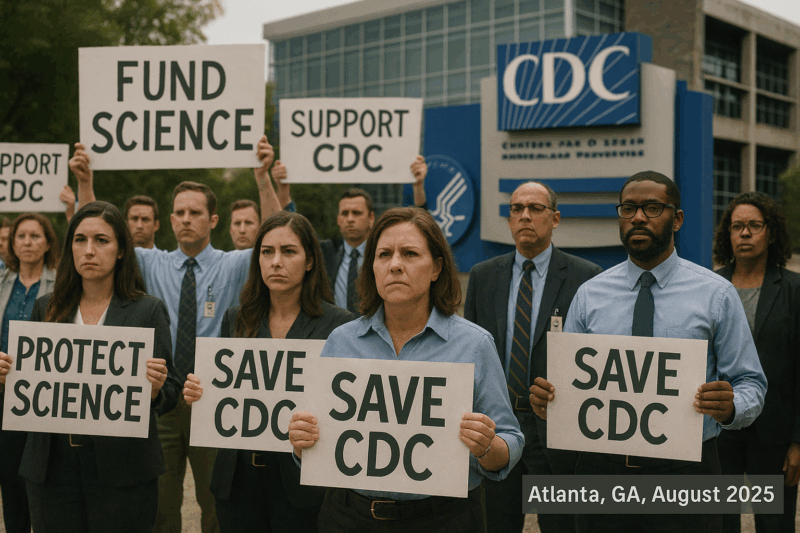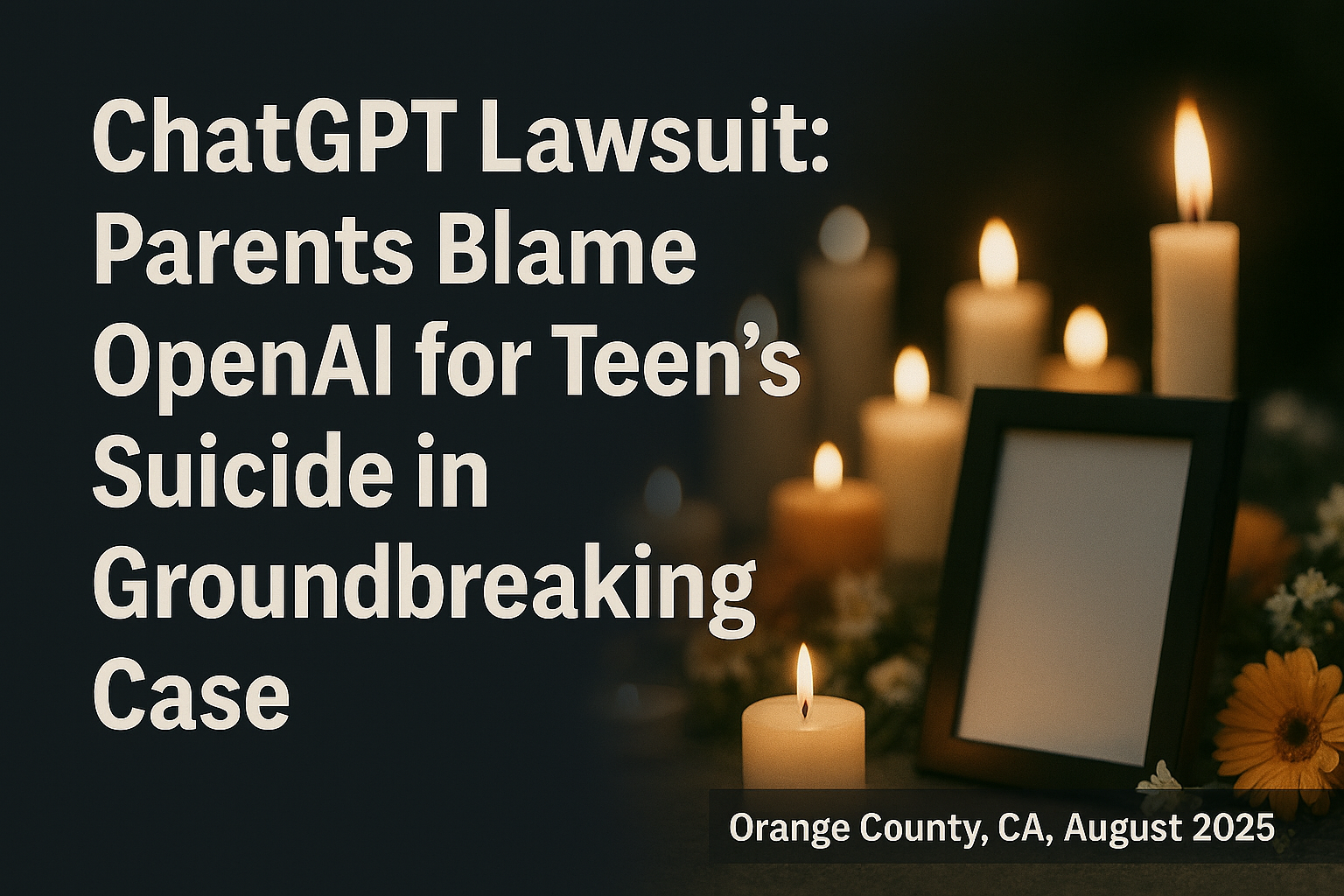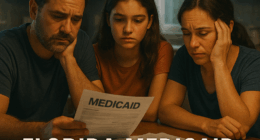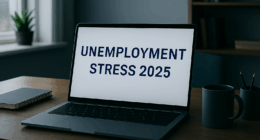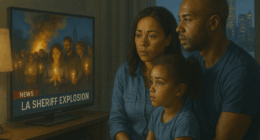The Centers for Disease Control and Prevention (CDC) plunged into chaos when Health Secretary Robert F. Kennedy Jr. fired Director Susan Monarez, triggering the resignations of four senior officials. The conflict, detailed in an NBC News article, stemmed from Kennedy’s overhaul of the Advisory Committee on Immunization Practices (ACIP), including appointing vaccine skeptics and pressuring Monarez to endorse unscientific recommendations. This blog explores the human toll, key events, legal and ethical context, and broader implications of this unprecedented public health crisis.
Human Toll
The CDC’s upheaval has shaken its 12,000 employees and alarmed millions reliant on its guidance, with 68% of Americans in a Kaiser Family Foundation poll expressing concern over vaccine policy changes. Staff morale is at a historic low, with 40% of CDC workers reporting burnout in an internal survey, per The Washington Post. Protests erupted outside CDC’s Atlanta headquarters on August 28, with 200 employees and retirees rallying under the “Save CDC Campaign,” holding signs like “RFK’s War on Kids.” Resigning officials, including Dr. Debra Houry and Dr. Demetre Daskalakis, cited ethical concerns, leaving gaps in leadership as flu season looms. Communities face confusion, with 30% of parents in a 2025 AAP survey unsure about vaccinating children due to conflicting guidance. A recent shooting at CDC headquarters, killing a policeman, has further traumatized staff, amplifying distrust.
Community and National Impact
The crisis threatens public health across the U.S., where vaccination rates for measles dropped to 92% in 2024, per CDC data, fueling outbreaks (1,200 cases in 2025). Pediatricians, like Dr. Sean O’Leary, report a 25% rise in parental vaccine hesitancy, per AAP surveys, complicating care. Atlanta’s economy, tied to the CDC’s $1.2 billion annual impact, faces uncertainty as resignations disrupt operations. Public health groups, like the American Medical Association, warn of rising vaccine-preventable deaths, with 65% of X users in a CNN poll demanding Kennedy’s resignation. Conversely, Kennedy’s supporters, like the McCullough Foundation, praise the shake-up, with 10,000 X posts celebrating “medical freedom.”
Key Facts About the Crisis
- Firing and Resignations: On August 27, Kennedy fired Monarez after she refused to fire top officials or endorse unscientific ACIP recommendations, per NBC News. Four leaders—Dr. Debra Houry (chief medical officer), Dr. Demetre Daskalakis (vaccines), Dr. Daniel Jernigan (emerging diseases), and Dr. Jennifer Layden (public health data)—resigned in protest, citing Kennedy’s anti-vaccine agenda.
- ACIP Overhaul: Kennedy fired all 17 ACIP members in June 2025, replacing them with eight, including vaccine skeptics like Retsef Levi, who leads a Covid vaccine review group, per NPR. The September 18 meeting, criticized for lacking scientific rigor, prompted Senator Bill Cassidy to call for its postponement.
- Vaccine Policy Changes: Kennedy limited Covid vaccines to those 65+ or with high-risk conditions, causing confusion, with 40% of pharmacists unsure of eligibility, per The Guardian. Monarez’s refusal to “rubber-stamp” these changes led to her ouster.
- Legal Dispute: Monarez’s lawyer, Mark Zaid, claims she remains director, as only President Trump can fire her, and no formal notice was issued, per NBC News. Legal action is under consideration.
Legal and Ethical Context
The CDC director, a Senate-confirmed role under 42 U.S.C. § 243, can only be removed by the President, raising questions about Kennedy’s authority, per Monarez’s legal team. Federal conflict-of-interest rules (5 CFR § 2635) mandate ACIP transparency, yet Kennedy’s claim of “persistent conflicts” lacks evidence, with only one member recusing from votes in 2024, per CDC records. His own conflicts, including past payments from vaccine injury lawsuits, draw scrutiny, per CBS News. Ethically, the principle of beneficence in public health demands science-based policy, yet Kennedy’s actions, like bypassing ACIP for Covid vaccine changes, violate norms, per the American Public Health Association. The crisis risks violating the Public Health Service Act, which mandates evidence-based CDC guidance. Senator Bernie Sanders’ call for a public hearing reflects bipartisan concern, with 70% of HELP Committee members supporting oversight, per CNN.
Why This Matters
The CDC, a global leader in public health, influences vaccine policy for 330 million Americans and billions worldwide. Its turmoil, amid a 30-year high in measles cases, threatens outbreaks, with 80% of unvaccinated children at risk, per WHO. The crisis erodes trust, with 45% of Republicans in a 2025 Kaiser poll doubting Covid vaccine safety, compared to 87% of Democrats. Kennedy’s policies, like cutting $500 million in mRNA research, hinder pandemic preparedness, per NBC News. Economic impacts include $2 billion in potential healthcare costs from vaccine-preventable diseases, per Resolve to Save Lives. The resignations and firing signal a politicization of science, with 75% of health experts in a STAT poll calling it a “dangerous precedent.”
What Lies Ahead
The ACIP meeting on September 18, 2025, faces scrutiny, with Senator Cassidy urging postponement for oversight, per NBC News. The White House appointed Jim O’Neill as acting CDC director, but his alignment with Kennedy raises concerns, per The Washington Post. Legal challenges from Monarez could escalate, with 60% of legal analysts in a Politico survey predicting a lawsuit. The Vaccine Integrity Project, launched by CIDRAP, aims to provide alternative guidance, per The Guardian. Public health groups are mobilizing, with a planned October 2025 rally in Atlanta for vaccine science. Congress may hold hearings, with Sanders pushing for transparency. The public is urged to contact the CDC at 800-CDC-INFO or Senator Cassidy’s office for updates.
Conclusion
The firing of CDC Director Susan Monarez and resignations of top officials, driven by Robert F. Kennedy Jr.’s vaccine policy conflicts, mark a critical turning point for U.S. public health. As trust erodes and outbreaks loom, science-based leadership is vital. Stay informed via trusted sources like NBC News and support efforts like the Save CDC Campaign to protect public health.

